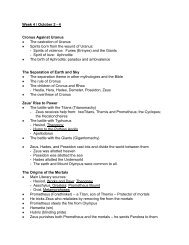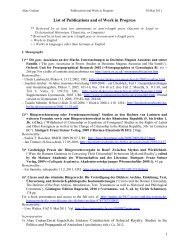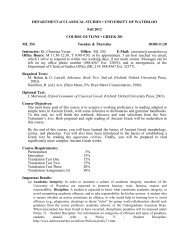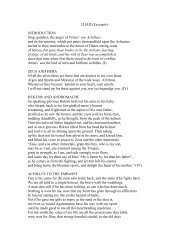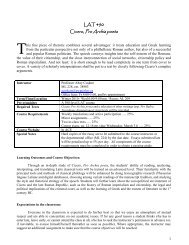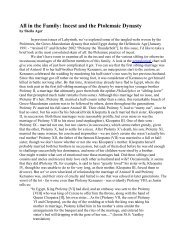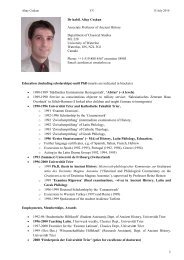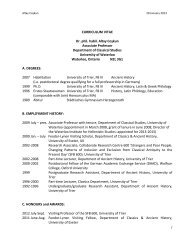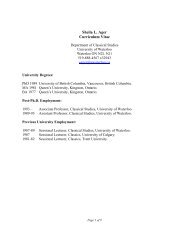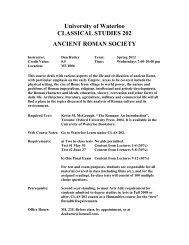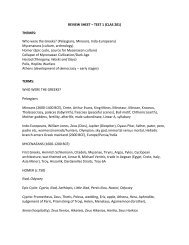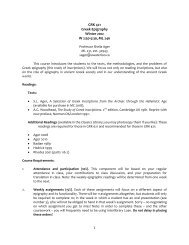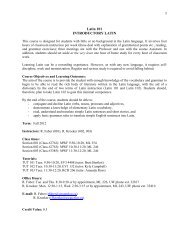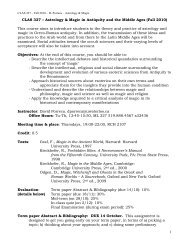Seneca's Sententiae
Seneca's Sententiae
Seneca's Sententiae
You also want an ePaper? Increase the reach of your titles
YUMPU automatically turns print PDFs into web optimized ePapers that Google loves.
"Drunkenness is Nothing Less than Wilful Insanity":<br />
<strong>Seneca's</strong> <strong>Sententiae</strong><br />
by R.A. Faber<br />
Lucius Annaeus Seneca ( c. 4 BC - AD 65) is remembered especially as the<br />
advisor to the emperor Nero and as moral philosopher. Yet he occupies an important<br />
place also in the history of prose writing. Now it must be said immediately that Seneca’s<br />
style - in both poetry and prose - has earned him much criticism, especially in the last one<br />
hundred and fifty years. The highly rhetorical quality of his writing and its apparently<br />
undisciplined nature have been the object of much scorn. In fact, already in antiquity<br />
Seneca’s style, particularly in comparison with that of Cicero, was considered<br />
unsuccessful; some even charged Seneca with causing the demise of fine Latin writing.<br />
One of the remarkable features of Seneca’s style is the sententia. A sententia is a<br />
carefully finished expression of a thought. It is a brief, pithy sentence pregnant with<br />
meaning. Any striking thought pithily conveyed may be called sententia, though often the<br />
saying is of general application beyond its immediate context. <strong>Sententiae</strong> occur in all<br />
periods of Latin literature, in both prose and poetry. They are not unrelated to the Greek<br />
gnomai, which are general propositions or proverbial expressions of opinion. <strong>Sententiae</strong><br />
were used sparingly in classical and pre-classical Latin; it is during the first century AD<br />
that employment of them increases. From Cicero’s perspective the over-use of sententiae<br />
indicated a lack of control, and reflected an undisciplined, perhaps youthful desire to<br />
make a point by brilliance rather than by truth.<br />
The poet Ovid, whose works influenced Seneca in some of his writing, uses<br />
sententiae to express unexpected thoughts, or thoughts that would be unusual in any<br />
context except the ones in which they occur. To give but one example of this type of<br />
sententia, consider a line in the story of Narcissus, who discovers that he is in love with<br />
his own reflection; the poet has him say: “I would that my lover and I were separated”<br />
(Metamorphoses 3. 467)!<br />
It is due in part to the influence of the schools of rhetoric in the late-Augustan<br />
period and thereafter that the sententiae became so popular. The popularity of public<br />
speaking also affected literary styles. The occurrence of sententiae increases throughout<br />
poetry and prose of the first century AD. The epic poetry of Lucan, for example, was<br />
noted for its use of the pointed, epigrammatic statement. Yet it was Seneca who became<br />
famous, if not notorious, for the use of sententiae.<br />
Seneca’s style of writing may be described as non-periodic and loose. Unlike<br />
Cicero, Seneca composed sentences that aimed at immediate impact rather than at full<br />
and complete expression. Often the structure of a Senecan sentence is abrupt, or loose.<br />
Instead of an involved and lengthy Ciceronian period, the Senecan sentence is brilliant<br />
and sharp. Rhetorical devices are employed to create a direct effect. The use of sententiae<br />
contributes to this immediate impact. The result is that the sentence may lack the qualities<br />
of majesty and dignity that are associated with Cicero’s style; on the other hand, Seneca’s<br />
sentences are neat and witty. The pointed style avoids stating the obvious, and prefers<br />
instead to aim at being ingenious.<br />
Seneca’s sententiae are marked by antithesis of thought or language, so that the<br />
process of reading is arrested by the striking collocation of ideas or words. Often
alliteration or homoioteleuton (word-endings of similar sound) enhance the sententia.<br />
Expected word order is replaced by effective arrangement; parallelism of elements not<br />
normally combined results in unexpected meaning. Thus the sententiae lend the writing a<br />
charged quality, a quality of power and significance. What a sententia may lack in<br />
originality of thought, it gains in ability to be applied universally. Seneca sometimes<br />
places sententiae at the end of a line of reasoning, as if to cap and complete the progress<br />
of the thought with a maxim. In such cases, the sententia has a final, conclusive quality.<br />
At other times he sprinkles sententiae throughout the development of an argument for the<br />
sake of variety or illustration; thus it causes the reader to stop and contemplate the rich<br />
meaning of the pithy proverb.<br />
In one of his many letters Seneca treats the topic of the condition of elderly<br />
people. Contrary to popular belief, he states, the elderly are not deprived of pleasure so<br />
dear to the younger generation. To make the point that those who are advanced in years<br />
have reached a stage in life at which a different type of pleasure operates, he writes: “To<br />
need no pleasure is itself a pleasure” (Epistle 12.5). Older folks often realize that they<br />
have no need, anymore, to pursue particular means of satisfaction; this realization is itself<br />
a pleasant discovery. By means of the sententia, then, Seneca illustrates his observation.<br />
In another letter, Seneca makes the point that “many people who inspire fear are<br />
themselves subject to it” (Epistle 14.10). Here, as in many other places, Seneca employs a<br />
sententia to state a truth about ethical behaviour. Often Seneca’s sententiae are statements<br />
of truth about human nature in general. Many of such epigrammatic pronouncements<br />
have a proverbial quality. In the satirical work, Apocolocyntosis, ascribed to Seneca’s<br />
authorship, there are several proverbs - a phenomenon common to both ancient and<br />
modern satirical writings. One memorable sententia is “a cock is master only of his own<br />
dunghill” (Apocolocyntosis 7.3). I’ll leave it to the reader to interpret and apply this<br />
proverb for himself.<br />
Some of Seneca’s sententiae apply only to a particular person, or a particular type<br />
of person. In the philosophical treatise, On the Brevity of Life, Seneca makes a very pithy<br />
assessment of Cicero’s tendency to praise his own consulship. He writes that Cicero<br />
praised his public role “not without cause, but without end” (On the Brevity of Life, 5.1)!<br />
Other sententiae, however, are applicable to all human beings equally. In On the<br />
constancy of the Wise (17.2) Seneca reminds us that “no one is laughable who can laugh<br />
at himself”. Such practical moralizing made Seneca famous. Yet, as I stated at the outset,<br />
Seneca’s generous use of sententiae was not appreciated by all, and it earned him the tag<br />
of being “sententious”. It is ironic that Seneca himself knows the value of the maxim: it<br />
should contribute to the overall structural effect of a work. He writes: “the author’s skill<br />
is intertwined in every line - and nothing from the tapestry can be removed without doing<br />
damage to the whole” (Epistle 33.5). To that advice we may respond, in conclusion: “the<br />
measure you give will be the measure you get.”



